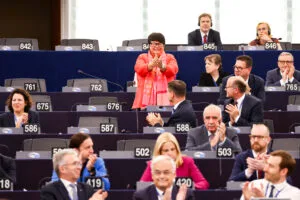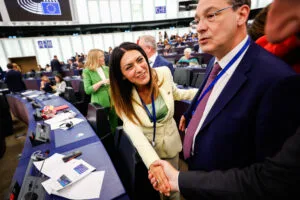From the envoy in Strasbourg – After the Presidency of the EU Parliament, the European People’s Party (EPP) also takes home its first, second, and third Vice-Presidency. A new political masterpiece for the parliamentary group most strengthened after the June 6-9 elections, with none of the controversy and backlash seen two-and-a-half-years ago, but still of great significance for the en plein on the podium of deputies of Roberta Metsola. The consolation for the Progressive Alliance of Socialists and Democrats (S&D) group is the election of more than a third of the 14 Vice Presidents and, more specifically for the Democratic Party, the confirmation of outgoing Pina Picierno for another term. In the second round of voting, Fratelli d’Italia scores a historic result with the election of one of its MEPs, Antonella Sberna, to the post of right hand to the President. The cordon sanitaire against the far-right worked, with all three candidates from Patriots for Europe (2) and Europe of Sovereign Nations (1) rejected.

Back to physical ballots after the (currently unsuccessful) experiment of electronic voting in January 2022, just like Metsola’s confirmation, the election of the 14 Vice-Presidents of the EU Parliament also followed a virtually already written script this afternoon (July 16). On the first round of voting, 11 passed, all from the centrist Popular-Social Democrats-Liberal majority, plus the Greens/ALE, who for the past month have been pushing for “responsibility” ahead of the confirmation vote of Ursula von der Leyen to the Presidency of the European Commission on Thursday (July 18).

With the required minimum threshold of 333 votes out of 665 validly cast, the three Populars – Germany’s Sabine Verheyen (604), Poland’s Ewa Kopacz (572), and Spain’s Esteban González Pons (478) – the five Social Democrats – Germany’s Katarina Barley (450), outgoing Vice President Pina Picierno (who opened the inaugural session of the EU Parliament, (405), the Romanian Victor Negrescu (394), Denmark’s Christel Schaldemose (378) and Spain’s Javi López (377) – the two from Renew Europe – Slovak Martin Hojsík (393), and Belgium’s Sophie Wilmès (371) – and Romania’s Green Nicolae Ștefănuță (347). By only 10 votes, Fratelli d’Italia MEP Sberna failed to reach the minimum threshold (323).

With the election proving that the perimeter of the majority does not include either the Left or the European Conservatives and Reformists (ECR), a second round was held, where the ‘cordon sanitaire’ against the far-right was finally applied. Not only against the Europe of Sovereign Nations group (which has only 25 members and is the smallest group) but more importantly towards Patriots for Europe, which, with 84 members, represents the third largest group in the EU Parliament. With the minimum threshold lowered to 305 votes (out of 609 validly cast), the two conservatives – Latvia’s Roberts Zīle (confirmed with 490) and Antonella Sberna (314), the first Italian radical right-wing MEP elected as Vice-President of the EU Parliament – and the Left’s candidate, France’s Younous Omarjee (311), were thus elected.
While the conservative right-wing finds further legitimacy in the top posts of the EU Parliament – Latvian Zīle had already been elected Vice-President in January 2022 – already since the beginning of the tenth term, the even more sovereignist and extreme right has been marginalized from political discourse in Strasbourg and Brussels. The three losers in the vote test are ESN’s candidate – the Polish Kondeferacja Ewa Zajączkowska-Hernik (46 votes) – and the PfE’s two choices, the Czech from ANO 2011 Klára Dostálová (116), and the former Frontex director elected from the ranks of the French National Rally Fabrice Leggeri (177).
English version by the Translation Service of Withub

![La presidente del Parlamento europeo, Roberta Metsola, interviene alla sessione plenaria del Cese [Bruxelles, 10 luglio 2024]](https://www.eunews.it/wp-content/uploads/2024/07/metsola-240710-350x250.jpeg.webp)




